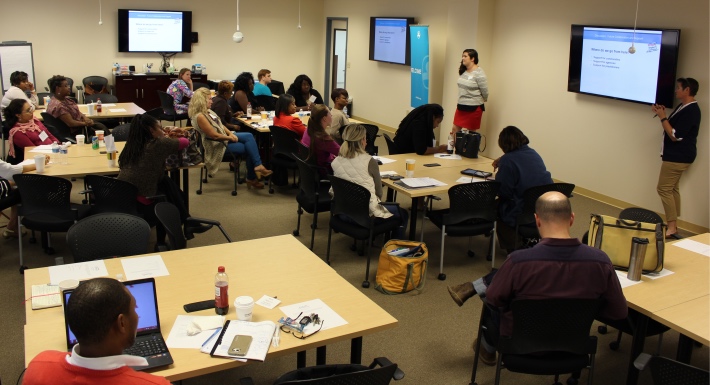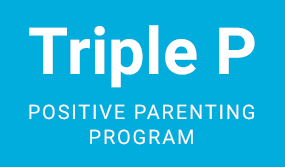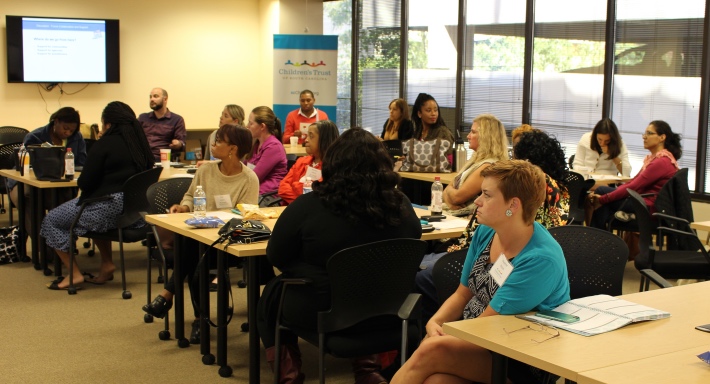Children’s Trust has begun an initiative to offer the Positive Parenting Program, more commonly known as Triple P, to child-serving organizations in South Carolina. Through regional meetings that aim to reach current practitioners and seek out new ones, Children’s Trust and Triple P America have teamed up to guide discussions on potential implementation supports, networking with other Triple P practitioners, and opportunities for future collaboration. Neil White, who tells the stories of Children’s Trust, covered several of these sessions.
Peggy Ford understands just how difficult parenting can be. Even the best parents can struggle on a given day, and for others, the task of guiding young children through life can be overwhelming.
That’s why Ford, the executive director of Children’s Place in Aiken, looks for the best programs to improve the lives of children and their parents. She knows lives aren’t changed in earthquake moments as much as they are formed in the smaller moments of daily life.
That’s also why she and her staff showed up at a Children’s Trust informational meeting recently to learn more about the evidence-based Positive Parenting Program, more commonly known as Triple P.
“For most parents, the difference between really being effective and having egg on your face is so subtle,” Ford said. “When you’re trying to figure out how subtle the difference is between being very effective and missing the mark, you need to have some idea where that is. I really love the idea of helping parents being able to assess parenting and what they’re doing with their families. That’s something Triple P does.”
Backed by more than 30 years of ongoing research since its origination in Australia, Triple P is currently used in 25 countries and 38 U.S. states to give parents practical strategies to assist them in managing their children’s behavior.
Children’s Trust has added it to an array of programs because of its proven effectiveness. Abby Wilson, the Triple P coordinator for Children’s Trust, is overseeing the initiative across the state in conjunction with Triple P America, which, coincidentally, is located in Columbia.
“Through regional meetings and strategic planning sessions, Children’s Trust has been focused on identifying partners around the state that have been delivering Triple P or interested in implementing the model in their community,” Wilson said.
“The partnership between Children’s Trust and Triple P America has been instrumental in moving these efforts forward to better support not only the families in our state, but the providers of services as well. By bringing partners together around this collective goal, we hope to increase the options available for parents and families.”

Abby Wilson and Courtney Towne lead an informational session on Triple P at the Children’s Trust offices.
Wilson is working with Triple P America implementation consultants Courtney Towne and Sara van Driel to spread the word to local agencies interested in the program. They have held meetings in Columbia and Greenville, and a strategic session in Spartanburg for Upstate partners was held in conjunction with the Mary Black Foundation.
Another informational meeting will be held Nov. 15 in Charleston.
“We are laying groundwork that’s really important for South Carolina and for Triple P,” Towne said. “The partnership between Children’s Trust and our national office has been a really great one with a shared vision of wanting to equip providers to do good work with families and make a difference in the lives of children.”
Triple P’s support system is designed to help parents address behavioral and emotional issues in children and teenagers that can lead to problems in the family, school and community.
As a way of creating environments that encourage children to realize their potential, Triple P offers five different levels to organizations depending on the needs of parents, who can receive assistance that can include single-visit consultations, public seminars and group courses, and private sessions.
The levels are designed to offer something for every parent. The program had a trial run in South Carolina 10 years ago in selected counties, and while some practitioners have continued to deliver the program, it had no broader framework across the state.
The collaboration between Children’s Trust and Triple P America intends to change the landscape in South Carolina.
“From a professional perspective, it’s our desire to take take the program to as many states as possible within the U.S. and scaling it statewide,” Triple P America CEO Brad Thomas said.
“The objectives of our organization and those of Children’s Trust are very closely aligned. To take a program like Triple P to scale, you need a key organization with a real leadership role in the state to be champions of the program. It is community-based program, and you need ownership at the community level and strong state leadership to get there.”

Thomas wants to see a similar process to the one that began in North Carolina about four years ago. Today Triple P is being utilized in more than 30 counties there.
“We’d love to see South Carolina head in that same direction with a gradual and thoughtful process of rolling it out,” Thomas added. “I would hope in one year that we’ve progressed to more training and more skill-equipping, and in five years, we see the program is rolled out in a reasonably significant way throughout the state.”
The five core principles of Triple P are ensuring a safe and engaging environment; creating a positive learning environment that helps children learn to solve problems; using assertive, consistent discipline that teaches children to accept responsibility for their behavior; having realistic expectations about children’s behavior; and taking care of yourself as a parent to find balance in life.
Chamlee Loscuito, the CEO of the Hope Center for Children in Spartanburg, has seen how well the program works for families in Spartanburg and Cherokee counties for four years. She is pleased to see this effort to spread the reach of Triple P in the Upstate area.
“It has been so exciting to see how much parents are embracing the concepts and support they receive from Triple P,” Loscuito said. “They often seek out more and more support because they find the tips to be so useful and the connection with other parents so meaningful.”
Loscuito realizes the daily struggles of parenting can lead to any number of moments when things go poorly. One of Triple P’s primary goals is to decrease the stigma of parents being too embarrassed to seek out assistance.
“Having someone to reach out to makes all the difference. Triple P is really about normalizing the stress of parenting,” she said. “No matter how much we might enjoy parenting, we all find it stressful sometimes and need to know it is OK to ask for help. Some of us need more help than others and more help at certain child ages. That is the beauty of multiple levels that are adaptable to each situation. We find it is really working with the parents we serve.”

Child-serving professionals learn more about Triple P.
At the informational session in Columbia, a number of interested agencies learned more about Triple P in order to determine if the program would be a good fit for their communities.
Some of them liked what they heard, including Alice Curtin Thaxton, director of education partnerships and policy for United Way of the Midlands.
“I’m hopeful that we can find ways to encourage organizations and partners at the United Way to use this programming,” Thaxton said. “I’m looking forward to learning more. One of the things I heard was that all parents want to be good parents, and it can be helpful to any and all families that want to be better parents for their children.”
Funding for this initiative comes from the federal Community-Based Child Abuse Prevention programs in South Carolina. These grants are funded by the U.S. Department of Health and Human Services, Administration for Children and Families.
As Children’s Trust teams with Triple P America to tap into practitioners who have already been trained and share information with providers, sites and agencies, people like Peggy Ford view this effort as an opportunity.
“It has so many different levels that it allows you to engage all of the community partners who are working with parents. It allows you to stay respectful of the work you’re already doing,” Ford said. “It is enormously exciting seeing it as a framework for the agency and the community.”




